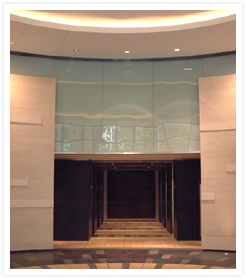Varieties of Double Glazing

In addition we can also provide sound-proof, insulated, curved and self-cleaning double glazing.
Sound-Proof or Acoustic Glass
Acoustic glass has the ability to massively reduce any noise that may be caused by local environments such as motorways, airports or railways. The ability of the glass to reduce background noise can be achieved to a variety of different levels with the more effective the sound-proofing of the glass resulting in a more expensive unit. It is important therefore for those customers looking to purchase sound-proof glazing to have an idea of how effective they wish the glass to be in keeping out noise to allow the glass to be produced specifically to their needs and to avoid spending unnecessary amounts of money. If you need advice on what level of sound-proof glass would best suit your needs then click here to contact us.
Insulated Glass
There are two main ways that double-glazed units can be additionally insulated:
- Apply a special coating called K-glass
- To introduce a layer of Argon gas in-between the two glass panels in a double-glazed unit .
Insulated glass can not only prevent vital heat escaping but can also help to reduce your carbon footprint and consequently your gas bills.
To get in touch with a member of our staff for more information on our insulated glass, click here.
Curved Glass
Curved Glass is flat glass that has been heated and shaped into a bend to fit into a particular building or frame. Curved glass can satisfy structural and decorative purposes and can be supplied and fitted as a toughened or laminated unit.
To get in touch with a member of our staff for more information on our curved glass, click here.
Self-Cleaning
Self-Cleaning glass is a recent innovation. The glass has a surface that keeps itself free of dirt and grime through natural processes. The very thin chemical coating on the outer surface of the glass causes two main effects. The first is an effect that allows ultra-violet rays to act as a catalyst in the breakdown of organic compounds on the window surface. The second is an effect in which water is attracted to the surface of the glass, forming a thin sheet which washes away these now broken-down organic compounds.
The maintenance of self-cleaning glass is also very easy.
Maintaining the Coating:
Tests have shown that the special coating on the self-cleaning glass will not flake off or discolour, but it will be affected if the surface itself is damaged; for example, by pointed objects or abrasive cleaners. For this reason, ink or paint must be carefully removed from the self-cleaning glass using a soft cloth and methylated spirits and never with harsh scouring glass cleaning agents, steel wool, razor blades or anything else that would scratch the glass.
Heavy Dirt Deposits:
The coating on self-cleaning glass normally breaks down even the heaviest deposits of organic dirt in time - but if the surface is so dirty that daylight cannot reach the glass, the self-cleaning action will not take effect. In such extreme cases, you will need to clean the glass with warm soapy water and a soft cloth. After a few days the self-cleaning process will have re-activated.
Maintaining During Dry Spells:
During very dry spells you may need to speed the window cleaning process up as there will have been no rain to wash loosened dirt away. This is easily done by simply hosing the glass down with water - which should remove most traces of dirt.
Note: organic dirt will not necessarily be removed by hosing, so some dirt may still be seen when the glass dries after the hosing treatment.
To get in touch with a member of our staff for more information on our Self-Cleaning glass, click here.


